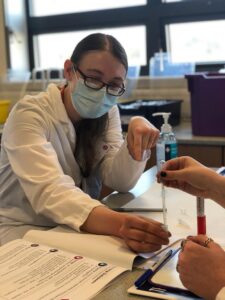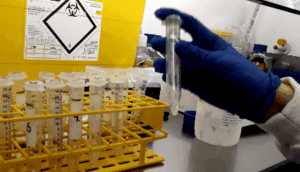Skills Lab Outreach – Sarah McCafferty
I volunteered earlier this month to take part in the Easter Bush Science Outreach Centre (EBSOC) project Skills lab, which aims to raise pupil awareness of technical and laboratory based careers, particularly among pupils who are undertaking a National 5 qualification in Lab Skills. This project aims to focus on pupils undertaking the Lab Skills National 5 as these pupils are more likely to feel that science is not accessible to them, and may lack confidence in their own skills within STEM subjects. Skills Lab provides an opportunity for these school pupils to engage with professionals working in the field, learn more about the variety of technical careers available within science, and develop their understanding of the scientific process by guiding the pupils through the process of completing a chromatography experiment, while encouraging them to think about experimental design and start thinking about how they will apply the technique of chromatography in their own investigations. Classes which are involved in this project will also take part in an online “Meet the Scientist” session where they have an opportunity to chat to a scientist, and finally will visit the EBSOC laboratory at Roslin.
On the day, I met up with Jayne Quoiani, EBSOC’s Education & Engagement Officer, and EBSOC Intern, Chloe, at the Roslin Institute reception, we got the car loaded with all our equipment, and after a quick pitstop at Dolly’s to grab lunch and caffeine, we were off to Hamilton and St. John Ogilvie High School. Once we got to the school, we met up with one of the school’s science teachers and got set up ready for our first group of pupils. Jayne opened the session with some introductions and then it was onto our first activity, deciding which of the sample tubes filled with a range of materials, including salt, oil and water and paint, the groups though contained mixtures. This led into another short activity where pupils were asked to place cards in order, to demonstrate the order of the scientific process, followed by a little practise using droppers and microdroppers, before we moved onto the first stage of our chromatography experiment. The pupils were asked to select a vegetable from 3 which were provided, and either acetone or ethanol for their experiment. Grinding the leaves using a mortar and pestle seemed to be a bit of a highlight of the process! Once the leaves had been ground and filtered we had a short discussion of what is a solution, with the pupils asked to select the solutions from apple juice, honey and a covid vaccine in their groups, before being asked how many pigments are present in the solution they produced in the first stage of the chromatography experiment. This slightly sneaky question led us nicely in the second stage of our experiment, loading the solution onto chromatography paper, using the microdroppers we had practiced with earlier, and placing the chromatography paper into our glass tube to run. As this experiment now needed a bit of time to achieve our desired outcome, we had an opportunity to chat about our jobs in the laboratory, and some of the solutions we are required to separate in our roles, with my trusty gif of DNA precipitating out of solution coming in handy to demonstrate some of the work I do in the Genetics Core. Then it was time to take a look at our experiment, take some measurements of how many pigments had been separated and how far the pigments had travelled, so the attendees could calculate the Retention Factor (Rf) of their separated pigments in a future class. Just before lunch we had a bit of time to discuss how they would apply the techniques used in this session to design their own experiment. As the pupils disappeared for lunch, there was time for us to clean up, set up for the next session before heading for our lunch and doing it all again in the afternoon.
It’s always really interesting to see what grabs attendees’ attention at outreach events and in our first class we had a bit of interest in the process of cloning. When we had a bit of downtime in the experiment, I briefly explained the process of how Dolly the Sheep was cloned, and touched upon the ethical issues around cloning, although I don’t think the ethics were quite so exciting as the idea of cloning! Although it was quite a full on day, it was great fun, and as a member of the University’s Technician Steering Committee I was really grateful for the opportunity to represent and raise awareness of technical career paths in STEM. If you think outreach is something you might be interested in, even/especially if your role is more technical or outside of the traditional academic science pathway, then I highly recommend you get involved, either by getting in touch with your local outreach and engagement officer, or signing up to join the EBSOC team to allow you to get notified of upcoming training and events.






Recent comments